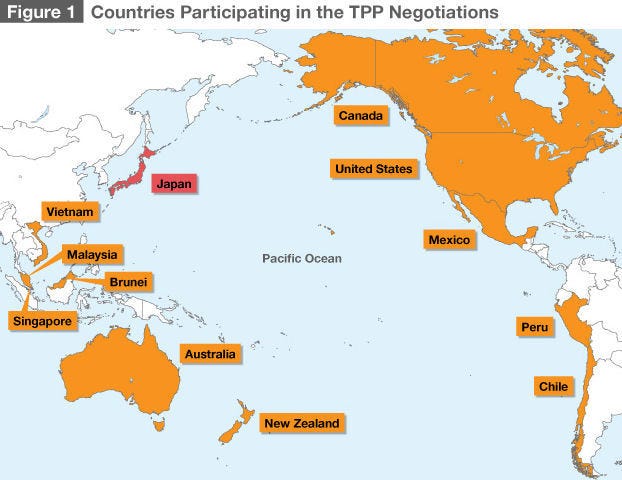Work still ahead despite TPP signing
Ministers formalize Trans-Pacific Partnership agreement and begin next phase of domestic approvals.

U.S. Trade Representative Michael Froman and representatives from 11 other countries met at a ceremony in New Zealand Feb. 4 to sign the Trans-Pacific Partnership agreement.
After more than five years of negotiations the “signing of the agreement signals an important milestone and the beginning of the next phase for TPP,” a joint statement from the ministers said. “Our focus now turns to the completion of our respective domestic processes.”

The 12 TPP countries comprise nearly 40% of global GDP, a market of more than 800 million people, and around one third of world trade.
For the United States, that does not look to be an easy route. In a speech earlier in the day, Finance Committee chairman Orrin Hatch (R., Utah) outlined the path forward for the TPP, saying the Obama Administration must complete many more steps, as required by bipartisan Trade Promotion Authority (TPA), before the trade agreement can be submitted to Congress for consideration.
Long road ahead
“No one should be under any illusions that, because the TPP is being signed today, an up or down vote on the agreement is imminent or that our oversight responsibilities are at an end,” Hatch said. “If history has taught us anything, it’s that this process can, and often does, take a very long time to complete. In fact, it’s not an exaggeration – or even all that remarkable – to say that it can take years to get an agreement through Congress after it is signed.”
Under the TPA statute, once an agreement is signed, the President has 60 days – April 3-- to provide Congress with a description of changes to U.S. law that he believes will be required under the deal. That is one of the more specific deadlines in the law – that 60 days is a maximum time period imposed on the administration, not on Congress.
On top of that, the statute requires the International Trade Commission, or ITC, to compile and submit a report on the likely economic effects of a signed trade agreement. That report must be completed within 105 days – another specific deadline – of the signing date. For a deal signed Feb. 4, that deadline is May 18th.
After Congress receives the President’s description of legislative changes and the ITC’s economic analysis, the administration is required to provide to Congress the final text of the agreement and a detailed plan on how they intend to administer it. The exact date and timing by which the administration has to submit the final text of the agreement is not set out in the statute, but likely would be determined after close collaboration and consultation with leaders in Congress.
There are many additional steps that take place once Congress has all of the required information and before the implementing bill is formally submitted, and those steps take time. This includes developing a draft implementation bill. And then committees of jurisdictions will hold hearings to examine the agreement and the draft legislation. Then there is a mock markup which occurs before the President formally submits the trade agreement to Congress.
Only after the final implementing bill is introduced is Congress under any kind of deadline to vote on the agreement – the votes must take place within 90 session days. This isn’t 90 calendar days, Hatch explained, but 90 session days and Congress decides when it is and is not going to be in session.
Historically speaking, the shortest period of time seen between the signing of an agreement and the introduction of implementing legislation, which, once again, triggers a statutory deadline for a vote in Congress, is 30 days. That was with the bilateral trade agreement with Morocco.
Hatch explained other trade agreements – like the agreements with South Korea, Colombia, and Panama – took more than four years to see an implementing bill introduced in Congress. “That’s four years from the time the agreement was signed – which is what is happening today with the TPP – and the time the clock started ticking for a vote in the Senate.” The North American Free Trade Agreement took 10 months between the day the agreement was signed and the introduction of an implementing bill, which triggers a required-yet-fluid timeline for a vote in Congress.
Hatch said the process will not be short-circuited. “We need to take the necessary time to carefully review the agreement and engage in a meaningful dialogue with the administration.”
He reiterated that TPP is an extremely important agreement and it needs to be done. “But, given that importance, we need to focus more on getting it right than on getting it done fast.”

Earlier action desired
In a statement, the National Corn Growers Assn., said it was pleased the TPP took another step forward. “This agreement is good for both corn farmers and our friends and partners in the livestock industry. We all want to see more American grains, meat and dairy on dinner tables around the world,” said NCGA president Chip Bowling.
“By supporting TPP, Congress can send a powerful message: the United States will lead on trade. That’s why NCGA members will be going to Capitol Hill in the coming months, asking Congress to vote in favor of the Trans-Pacific Partnership agreement in 2016.��”
A recent report estimated that the TPP will increase annual real incomes in the United States by $131 billion, or 0.5% of GDP. It also found that delaying action on TPP by just one year would represent a $94 billion permanent loss to the U.S. economy by giving up gains that compound over time. (See full story here.)
About the Author(s)
You May Also Like




.png?width=300&auto=webp&quality=80&disable=upscale)
